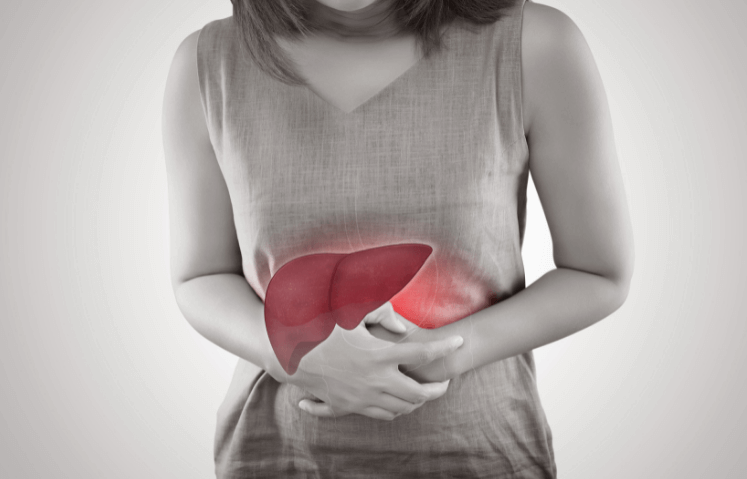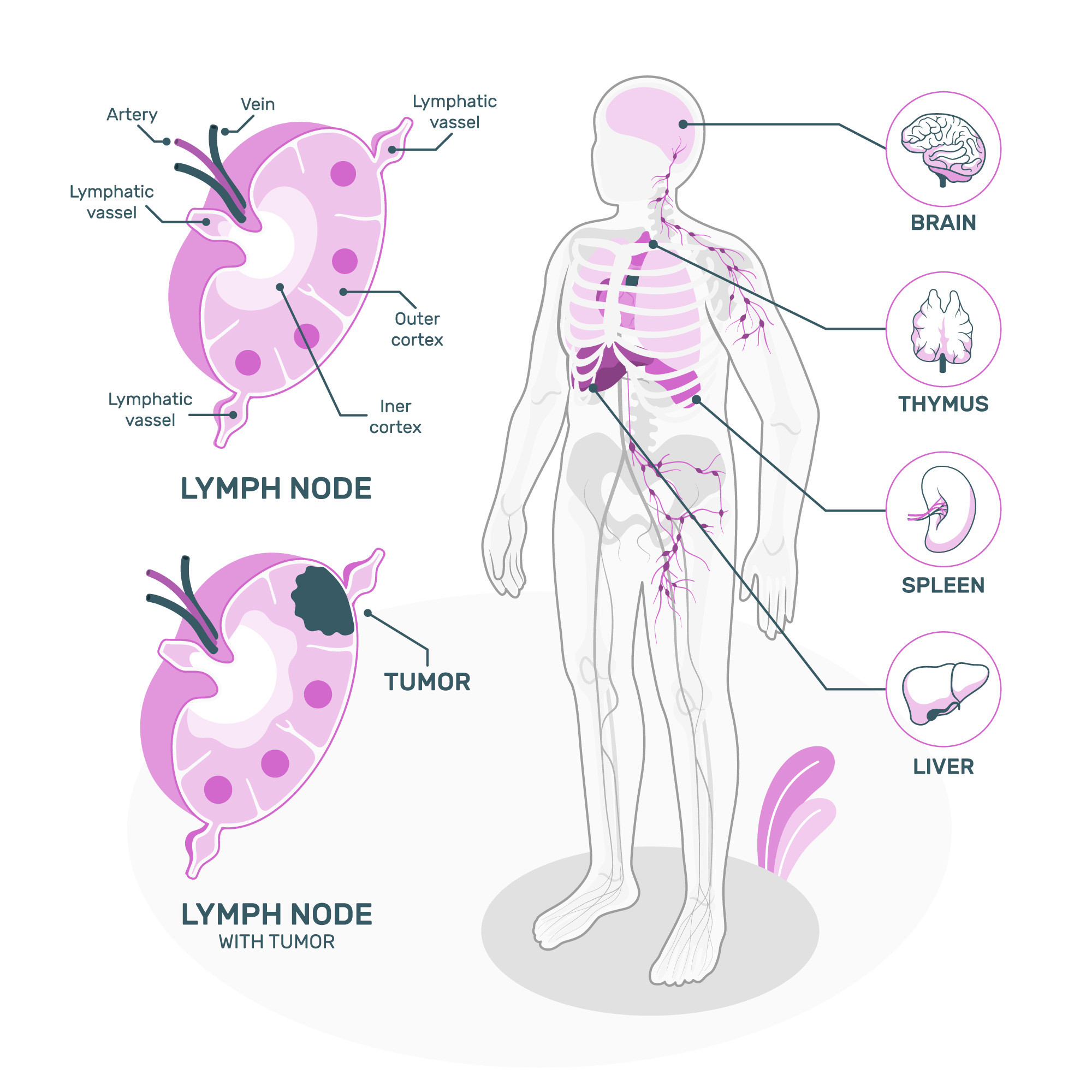Definisi
Hati merupakan salah satu organ dalam perut yang berukuran sebesar sebuah bola sepakbola. Lebih spesifik, hati berada pada bagian kanan atas dari perut dan di bawah diafragma. Sel-sel pada hati dapat tumbuh tidak terkontrol dan menyebabkan gangguan. Kondisi ini disebut sebagai neoplasma hepar.
Kanker hati atau neoplasma hepar merupakan kanker yang tumbuh pada sel hati. Kanker hati merupakan jenis kanker yang menempati urutan kedua sebagai kanker yang menyebabkan kematian terbanyak di dunia. Diketahui bahwa laki-laki memiliki insidensi mengalami kanker hati 11.5 per 100.000 kasus dibandingkan dengan perempuan yaitu 3,9 per 100.000 kasus.
Terdapat beberapa jenis kanker yang dapat menyerang hati. Jenis yang paling sering muncul yaitu hepatocellular carcinoma (HCC). Selain HCC, terdapat jenis kanker hati lain, yaitu kolangiokarsinoma intrahepatik dan hepatoblastoma. Kedua jenis kanker hati ini lebih jarang ditemukan ketimbang HCC.
Kanker yang menyebar ke hati lebih banyak ditemukan dibandingkan dengan jenis kanker yang sejak awal muncul dan tumbuh di hati. Kanker yang muncul dan tumbuh pertama kali di bagian tubuh lain, seperti kolon atau usus besar, paru atau payudara, yang kemudian menyebar ke hati, disebut sebagai kanker metastasis. Kanker jenis ini dinamai berdasarkan tempat pertama kali kanker muncul dan tumbuh. Contohnya kanker metastasis kolon (usus besar). Penamaan ini digunakan untuk mendeskripsikan tempat pertama kali kanker muncul dan kemudian menyebar ke hati.
Penyebab
Kanker hati terjadi ketika sel hati berubah karena mengalami mutasi (perubahan) pada DNA selnya. Sel hati memiliki DNA yang mengatur perubahan dan proses kimia yang terjadi pada sel tersebut. Ketika DNA pada sel mengalami mutasi, hal ini dapat menyebabkan sel tumbuh tidak terkendali dan membentuk massa.
Tidak jarang kanker hati disebabkan oleh infeksi kronik hepatitis. Infeksi hepatitis B dan hepatitis C kronis merupakan penyakit yang paling sering menyebabkan terjadinya kanker hati. Namun, kanker hati juga dapat terjadi tanpa adanya penyakit yang mendasari dan tanpa penyebab yang jelas.
Faktor Risiko
Terdapat beberapa faktor risiko terjadinya kanker hati, yaitu:
- Infeksi kronis hepatitis B atau hepatitis C
- Sirosis hati (kondisi progresif dan irreversible yang menyebabkan jaringan pada hati berubah menjadi jaringan parut)
- Beberapa penyakit hati yang diturunkan secara genetik, seperti hemokromatosis dan Wilson’s disease
- Diabetes
- Perlemakan hati non alkoholik
- Mengonsumsi alkohol terlalu banyak
- Paparan aflatoksin (merupakan senyawa beracun yang dihasilkan oleh jenis jamur kapang)
Gejala
Kebanyakan orang tidak menyadari gejala awal dari kanker hati. Berikut beberapa gejala yang dapat muncul, yaitu:
- Penurunan berat badan tanpa penyebab
- Hilang nafsu makan
- Nyeri pada perut kanan atas
- Mual dan muntah
- Merasa cepat lelah dan lemah
- Perut membengkak
- Kulit dan bagian putih mata terlihat kuning (jaundice)
- BAB atau kotoran berwarna pucat seperti dempul
Diagnosis
Anamnesis (Wawancara mendalam)
Kebanyakan pasien tidak mengeluhkan adanya gejala pada fase awal penyakit. Namun, tidak jarang pasien mengeluhkan gejala yang berkaitan dengan penyakit hati kronis. Pasien mungkin mengeluhkan adanya ketidaknyamanan atau kembung pada perut bagian atas, penurunan berat badan, demam, hilangnya nafsu makan, diare, dan gejala-gejala lain.
Dapat juga ditemukan adanya gejala dekompensasi hati akut, seperti munculnya asites (perut tampak membesar), ensefalopati (kelainan pada otak), jaundice (penyakit kuning), hematemesis (muntah darah). Jika terdapat gejala-gejala tersebut, perlu dicurigai adanya kanker hati.
Pemeriksaan Fisik
Pada pemeriksaan fisik, dokter dapat menemukan beberapa tanda penyakit hati kronis atau sirosis stigmata, yaitu hepatomegali (pembesaran hati), splenomegali (pembesaran limpa), asites, jaundice, munculnya caput medusa (pelebaran pembuluh darah vena di sekitar pusar) atau disebut juga sebagai the palm tree sign. Caput medusa muncul dikarenakan adanya pelebaran pada pembuluh vena.
Pemeriksaan Penunjang
Setelah dilakukan anamnesis dan pemeriksaan fisik, dokter akan melakukan pemeriksaan penunjang sesuai dengan indikasi. Beberapa pemeriksaan penunjang yang dapat dilakukan berupa pemeriksaan laboratorium, pemeriksaan pencitraan, dan pemeriksaan biopsi.
- Pemeriksaan laboratorium dilakukan pemeriksaan sampel darah dan ditemukan adanya kelainan pada fungsi hati. Dilakukan juga pemantuan lanjutan laboratorium pada pasien suspek atau pasien yang telah terdiagnosis kanker hati untuk mengetahui adanya kelainan pada hasil laboratorium.
- Pemeriksaan pencitraan yang dapat dilakukan berupa USG, CT scan dan MRI.
- Pemeriksaan biopsi hati dilakukan dengan cara mengambil sedikit jaringan hati untuk diperiksa di bawah mikroskop guna mencari sel kanker pada hati. Pemeriksaan biopsi berisiko terjadinya perdarahan, memar, dan infeksi.
Tata laksana
Kanker hati, terutama jenis hepatocellular carcinoma (HCC), masih tergolong kanker yang sulit untuk ditata laksana. Tata laksana yang dilakukan pada kanker hati tergantung pada stadium dan usia penderita.
-
Operasi
Jika ukuran tumor tergolong kecil dan hati Anda masih dapat berfungsi dengan baik, dokter akan menyarankan Anda untuk melakukan operasi pengangkatan tumor. Pengangkatan dilakukan dengan cara mengangkat tumor beserta sedikit jaringan sehat di sekitarnya. Jika hati sudah tidak dapat berfungsi dengan baik, maka dibutuhkan operasi transplantasi hati. Pada prosedur ini, hati yang terkena kanker akan diangkat dan digantikan dengan hati sehat dari seorang pendonor.
-
Terapi terlokalisir
Terapi jenis ini ditargetkan secara langsung pada sel kanker atau area di sekitar sel kanker. Terdiri dari beberapa cara, yaitu memanaskan sel kanker, membekukan sel kanker, menyuntikkan alkohol ke dalam sel kanker, atau menyuntikkan obat kemoterapi ke dalam hati.
-
Terapi Radiasi
Terapi ini dilakukan dengan menggunakan energi bertenaga tinggi dari sumber seperti X-rays atau protons yang kemudian digunakan untuk menghancurkan sel kanker dan membuat tumor menyusut. Terapi radiasi bisa jadi sebuah pilihan jika terapi lain tidak memungkinkan untuk dilakukan.
-
Terapi Imunoterapi
Imunoterapi menggunakan sistem imun untuk melawan kanker. Sistem imun penderita kanker hati tidak menyerang sel kanker karena sel kanker memproduksi protein yang membutakan sel imun. Imunoterapi berfungsi untuk menganggu proses tersebut sehingga sel imun dapat menyerang sel kanker.
-
Terapi Kemoterapi
Kemoterapi menggunakan obat untuk membunuh sel yang tumbuh secara cepat, termasuk sel kanker. Kemoterapi dapat dimasukan melalui pembuluh vena pada tangan Anda, dapat juga dimasukan dalam bentuk pil, atau diberikan dalam bentuk keduanya.
-
Terapi Supportive atau palliative care
Terapi paliatif dilakukan dan berfokus pada mengurangi penderitaan dan rasa sakit yang dirasakan oleh penderita kanker hati. Terapi paliatif ini dilakukan bersamaan dengan terapi agresif lain, seperti operasi, kemoterapi, atau terapi radiasi.
Komplikasi
Komplikasi dari kanker hati dapat berupa gagal hati. Kematian dapat terjadi jika keluhan kanker hati disertai dengan kaheksia/wasting syndrome (kondisi yang menyebabkan penurunan berat badan ekstrem), perdarahan di perut atau organ dalam perut, atau adanya robekan pada tumor. Kanker hati dapat menyebabkan terjadinya metastasis ekstrahepatik ke organ-organ lain, seperti kelenjar anak ginjal, peritoneum (selaput tipis pelapis organ perut), otak, kulit, rongga mulut, dan jaringan lain.
Pencegahan
- Kurangi risiko terjadinya sirosis hati. Sirosis merupakan perubahan jaringan hati menjadi jaringan parut. Untuk mengurangi risiko terjadinya sirosis, batasi jumlah konsumsi alkohol dan kontrol agar berat badan tetap ideal.
- Jika anda merupakan seorang perokok, maka berhentilah merokok.
- Lakukan vaksinasi hepatitis
- Cegah terkena hepatitis C yaitu dengan cara jangan menggunakan jarum suntik secara bergantian, gunakan pengaman saat berhubungan seksual kecuali jika pasanganmu sudah pasti tidak mengidap hepatitis C. Jika ingin membuat tato, carilah toko yang bersih dan terjamin steril dalam penggunaan jarum untuk tato.
- Jika Anda telah mengidap hepatitis B atau hepatitis C, lakukan pengobatan rutin.
- Jika Anda tidak mengidap hepatitis B atau hepatitis C, tatap lakukan screening terhadap hepatitis B, C, dan sirosis secara berkala.
Kapan Harus Ke Dokter?
Jika Anda memiliki risiko terjadinya kanker hati lakukan pemeriksaan rutin ke dokter untuk mencegah terjadinya kanker hati dan komplikasinya. Segera ke dokter jika Anda mengeluhkan gejala-gejala yang sudah dijelaskan di atas.
- dr Nadia Opmalina
Cicalese, Luca. Liver Cancer. . [Updated 2021 Aug 31]. Medscape [Internet]. Available from: https://www.mayoclinic.org/diseases-conditions/liver-cancer/diagnosis-treatment/drc-20353664
Medscape. Liver Cancer. [Updated 2021 Aug 31]. Medscape [Internet]. Available from: https://www.mayoclinic.org/diseases-conditions/liver-cancer/symptoms-causes/syc-20353659
Gelband H, Chen CJ, Chen W, et al. Liver Cancer. In: Gelband H, Jha P, Sankaranarayanan R, et al., editors. Cancer: Disease Control Priorities, Third Edition (Volume 3). Washington (DC): The International Bank for Reconstruction and Development / The World Bank; 2015 Nov 1. Chapter 8. Available from: https://www.ncbi.nlm.nih.gov/books/NBK343640/ doi: 10.1596/978-1-4648-0349-9_ch8
Liu, C. Y., Chen, K. F., & Chen, P. J. (2015). Treatment of Liver Cancer. Cold Spring Harbor perspectives in medicine, 5(9), a021535. https://doi.org/10.1101/cshperspect.a021535
Asafo-Agyei KO, Samant H. Hepatocellular Carcinoma. [Updated 2021 Aug 8]. In: StatPearls [Internet]. Treasure Island (FL): StatPearls Publishing; 2022 Jan-. Available from: https://www.ncbi.nlm.nih.gov/books/NBK559177/
Recio-Boiles A, Babiker HM. Liver Cancer. [Updated 2021 Jul 17]. In: StatPearls [Internet]. Treasure Island (FL): StatPearls Publishing; 2022 Jan-. Available from: https://www.ncbi.nlm.nih.gov/books/NBK448337/












